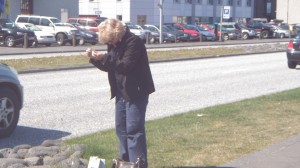Every issue we invite two experts to debate a hot button issue in The Argument, and then invite you to join the conversation online - we’ll read all your comments and select the best to print next issue. (We’d prefer you to use your real name, but would love to hear what our readers have to say either way.) If you can’t comment, then you can simply vote in our poll, which you’ll find partway down the debate.
Looking for a previous Argument? See the full list of debates.
Chris
I am looking at a website that tells me how much electricity is coming from various sources around Britain. After a decade of financial incentives, wind turbines are currently producing about two per cent of our electricity. Excluding a small amount of hydro, all our electricity is coming from fossil fuels and nuclear. Britain’s 10 nuclear power stations are now producing 10 times as much energy as comes from 3,000 turbines.
I would love it if we powered our entire economy from renewables but I see no political will to achieve this aim. We would need to invest billions now in renewable technologies. Without nuclear, reducing carbon emissions at high speed is impossible. We might end up keeping old coal power stations open for the next 30 years.
People say that we simply need to work harder to persuade a largely indifferent public to accept huge numbers of turbines and to invest billions in other renewable technologies. Such idealism is irresponsible: if we truly believe that climate change is the greatest threat the world has ever faced, we cannot risk failing to achieve the growth in low-carbon energy sources. However much we may regret this, nuclear is the only technology capable of delivering large amounts of power within the next decade. We in the environmental movement have failed to get the UK to invest in renewables and we now have no alternative but to welcome nuclear power.
Jose
Nuclear plants need to be phased out because they are dangerous, toxic and impede the adoption of the three key options needed to build a carbon-free energy future: conservation, efficiency and renewable energy. Conservation and efficiency (i.e. doing more with less) represent two of the three most profitable opportunities to create new jobs and address climate change. To visualize the potential: Canada and the US use electricity at embarrassingly greater per capita rates compared to leading industrialized nations like Denmark and Germany.
Those two nations have not only minimized the way their citizens use power, they’re also constantly innovating efficient design and they’ve become world leaders in the development of renewable energy sources.
Their success is based on developing pragmatic renewable-energy policies, such as feed-in tariffs, which quickly enable entrepreneurs to innovate in vibrant markets that guarantee easy interconnection, fair long-term prices for all types of renewable energy and investment stability.
Germany’s renewable-energy policies in the last 10 years have become the most important climate-mitigation strategy in Europe and are a strong engine of industrial innovation and employment creation.
Germans and Danes have understood that nuclear plants cannot complement renewable- energy sources, as they cannot be turned on or off easily. Furthermore, they also understand that building nukes forces you to sell vast amounts of electricity, which acts as a clear contradiction to efforts at conservation and efficiency.
These lessons are starting to be understood by 148 other nations that have formed the International Renewable Energy Agency to develop rapidly a new paradigm of energy security and climate protection.
Chris
If we believe that climate change is the world’s greatest threat, we cannot risk failing to achieve the growth in low-carbon energy sources. Nuclear is the only technology capable of delivering large amounts of power within the next decade
Almost all of us welcome the rapid growth in renewables but even in Germany only 17 per cent of electricity comes from these sources. The key question is whether renewables have any prospect of growing fast enough to replace fossil fuel sources completely. In the UK and almost everywhere else, I don’t think anybody pretends that low-carbon sources are increasing at anywhere close to a fast enough rate. That is why nuclear is vital – not because we don’t want renewables.
The second illusion is to believe that energy-efficiency measures can significantly reduce demand for electricity. All independent sources predict a rise in electricity use because of home heating and the need to switch to electric vehicles. Conservation efforts are barely denting the demand for power. Environmentalists can bemoan the lack of interest in efficiency. But we need to deal with the world as it is, not how we want it to be. We may not like today’s consumerist, high-energy use lifestyles but we cannot change the world’s priorities overnight. Nuclear power is necessary to meet people’s demands for electricity.
Jose
I’d like to set the record straight on nukes:
- Nukes are toxic and pose great dangers to present and future generations (Fukushima is now a level 7 catastrophe, the same as Chernobyl).
- Nukes take at least a decade to build and are highly context-dependent design projects (i.e. a nuke design from Canada cannot be cut and pasted in seismically active places without major design modifications, which by definition involve higher costs, longer timelines, and trial/error experimentation).
- Nukes are not cheap and uranium is a finite, non-renewable toxic mineral.
- Nukes can easily be diverted for atomic weapons – one reason the technology has ‘strong’ fans.
Renewable sources on the other hand:
- Are much safer, have vastly smaller ecological footprints, and represent strategic assets for current and future generations.
- Most renewable energy systems are manufactured today in assembly lines and can therefore be deployed and implemented very quickly anywhere suitable.
- Most renewable energy systems benefit from economies of scale; therefore the more money we invest in them the cheaper they become. Plus they use fuels that are plentiful and cheap (e.g. sun and wind) or can be locally produced at stable prices (e.g. biogas/biofuels).
- Renewables can promote local resilience and energy autonomy, so diffusing sources of conflict instead of becoming weapons.
Chris
Carry on regardless: China is pushing ahead with its nuclear power programme, with 13 reactors in operation and 35 more, including this one in southeast Fujian province, under construction. Zhang bin fj / AP / Press Association Images
Fukushima is a horrible disaster but we can reasonably expect that no-one will die as a result of the radiation leaks. Yes, nuclear power is very expensive but so are all low-carbon technologies. Most studies show nuclear costing less than offshore wind. What is more, nuclear will deliver power reliably and throughout the year.
People who live and work near nuclear reactors seem happy to have them as neighbours. By contrast, in Britain at least, onshore wind is widely detested.
I cannot accept that other technologies have ‘vastly smaller ecological footprints’. A new nuclear station will generate the same amount of electricity as about 3,000 wind turbines covering hundreds of square kilometres and requiring far more steel, concrete and disruption to wildlife.
We come back to the core argument. There is no political will anywhere in the world to make renewable electricity happen in sufficient amounts. I deeply regret this. Environmentalists watching the world sleepwalk into multiple ecological disasters have to act responsibly and accept that nuclear power is one of the few ways we have of maintaining standards of living while reducing the CO2 production from electricity generation.
Jose
Nuclear plants need to be phased out because they are dangerous, toxic and impede the adoption of the three key options needed to build a carbon-free energy future: conservation, efficiency and renewable energy
So what do we need to globalize a sustainable energy path?
Massive creativity, courage and political will – plus we need to design global deployment strategies for renewable energy that have tangible local social benefits.
For example, farmers who can own or at least benefit directly from wind turbines see them as a desirable cash crop. Schools with solar roofs see them as versatile teaching tools. Hospitals that can have lower fuel bills and cheap hot water via district energy see biomass CHP technology (combined heat and power) as a smart investment.
Our biggest obstacle to solving climate change with renewable energy, conservation and efficiency is the limited experience that most people have with these options. For all of us the most crucial strategy is to get directly involved in ‘learning by doing’ – and to fully use our creativity, which is itself a renewable and unlimited resource.
Goodall, Chris, and Jose Etcheverry. "Is nuclear power necessary for a carbon-free future?." New Internationalist Magazine 1 June 2011: n. pag. www.newint.org. Web. 14 June 2011.











 Right: Peter Victor
Right: Peter Victor  Dr. Rachel Hirsch has been awarded the 2011-12 Labrador Institute Postdoctoral Fellowship <
Dr. Rachel Hirsch has been awarded the 2011-12 Labrador Institute Postdoctoral Fellowship <.jpg) Left: Stepan Wood
Left: Stepan Wood Canada’s legal and political engagement with globalization” and “a comprehensive account of Canada’s entanglement with globalization’s legal rules and institutions.”
Canada’s legal and political engagement with globalization” and “a comprehensive account of Canada’s entanglement with globalization’s legal rules and institutions.”
